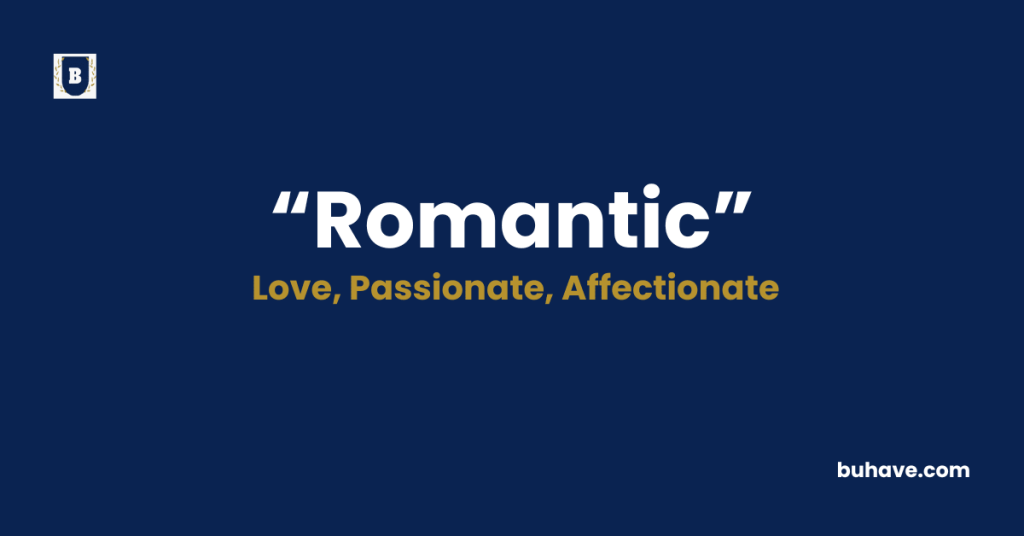The word ‘Romantic’ (Adjective) describes an idealistic or dreamy way of thinking. For example, someone might hold a romantic view” of the world, imagining it filled with adventure, passion, and meaning even if those ideas aren’t always practical.. in this guide, you’ll learn the full definition, synonyms, antonyms, etymology, and real-life examples of how to use ‘Romantic’ correctly in sentences.
Romantic Explained in Depth
A complete and detailed guide to the words Romantic including meaning, definition, examples, etymology, synonyms, and antonyms.
Meanings of Romantic
At its core romantic relates to deep affection, love, and emotional connection, especially in a personal or intimate relationship. When someone is described as romantic they often express love through thoughtful gestures, poetic words, or grand symbolic acts like planning a surprise date or writing heartfelt letters.
But romance also extends into other realms: a romantic person might appreciate nature, art, or life itself with a heightened sense of beauty and emotion.
Definition
romantic describes an idealistic or dreamy way of thinking. For example, someone might hold a “romantic view” of the world, imagining it filled with adventure, passion, and meaning even if those ideas aren’t always practical. This ties back to the Romantic movement in literature and art, where emotion, imagination, and nature were celebrated above logic and reason.
So whether it’s love, a style of writing, or a way of seeing the world romantic always implies emotional richness, beauty, and a certain dreamlike or idealistic quality.
Etymology
The word “romantic” originates from the Latin term Romanicus, which meant “in the Roman style.” In the Middle Ages, this evolved into “romanz” in Old French, referring to tales of chivalry, heroism, and love written in the vernacular Romance languages rather than Latin.
By the 17th century, “romantic” in English described imaginative stories set in faraway lands or involving heroic deeds and passionate love. This meaning expanded during the Romantic Era of the late 18th and early 19th centuries. Writers and artists like Wordsworth, Shelley, and Goethe emphasized emotion, nature, and individualism. In this context, “romantic” described not only love but also a deeper connection to beauty, the sublime, and the imagination.
Today, “romantic” retains those historical layers—it can mean affectionate and loving, but also dreamy, idealistic, or emotionally expressive in any area of life.
Example Sentences
- He planned a romantic getaway for their anniversary in the countryside.
- She’s a true romantic at heart, always writing poetry and dreaming of love stories.
- The movie had a romantic subplot that made the characters’ journey more emotional.
- They enjoyed a candlelit dinner with soft music in a romantic setting.
- His romantic view of life often led him to chase dreams others thought unrealistic.
Romantic Synonyms
- Affectionate
- Passionate
- Sentimental
- Idealistic
- Lovey-dovey
- Emotional
- Dreamy
- Chivalrous
- Poetic
- Heartfelt
Romantic Antonyms
- Unromantic
- Practical
- Cynical
- Indifferent
- Cold
- Unfeeling
- Rational
- Detached
- Stoic
- Apathetic
FAQs about Romantic
1. Is “romantic” only about love and relationships?
No. While “romantic” often refers to love, it can also describe an emotional or idealistic perspective in art, nature, or life in general—especially in a poetic or imaginative context.
2. What is the Romantic movement?
The Romantic movement was a literary and artistic era from the late 1700s to the mid-1800s that emphasized emotion, nature, and imagination. It reacted against the rationalism of the Enlightenment and celebrated personal experience and creative freedom.
3. Can you call someone “a romantic”?
Yes. If someone enjoys expressing love, dreams of fairy-tale relationships, or values emotional connection, they are often described as “a romantic.”
4. How is “romantic” used in modern speech?
In everyday language, “romantic” usually describes affectionate actions (like a romantic date) or idealized relationships. It’s a very common word in both casual and formal settings.
5. Is “romantic” always a positive word?
Generally, yes. However, in some cases, it might be used critically like when someone’s romantic ideals are seen as unrealistic or overly sentimental.

















